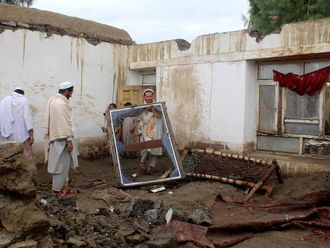_resources1_16a08543de7_medium.jpg)
STUNG TRENG, Cambodia: Cambodian premier Hun Sen on Monday opened the country’s largest hydropower scheme, swatting aside dire warnings about the environmental impact of the $780 million (Dh2.8 billion) project and its affect on local communities.
Backed by Chinese funding, the impoverished Southeast Asian nation has embarked on a dam-building spree in recent years, as it tries to boost its energy capacity and jump-start its economy.
But the 400 megawatt Lower Sesan 2 is one of several dams criticised by environmentalists for threatening crucial fish stocks along Mekong River waterways.
Around 5,000 people — mostly from marginalised indigenous groups — could be displaced by the project, according to activists.
Hun Sen strongly defended the controversial scheme at the official opening in the northeastern province of Stung Treng, saying affected villagers were compensated with houses and land.
“Most people support this development project, but some villagers created a difficult situation due to incitement by some foreigners,” he said, adding that it would help reduce electricity costs.
_resources1_16a08543de5_original-ratio.jpg)
The United Nations has previously raised concerns about the dam while some scientists had joined calls for it to be halted over fears for the region’s food supply.
The NGO International Rivers has warned it will have a “costly catastrophic impact on the Mekong River’s fisheries and biodiversity”.
Built along tributaries of the Mekong, The Lower Sesan 2 is a joint venture between Cambodia’s Royal Group (39 per cent), Chinese state-owned Hydrolancang International Energy (51 per cent) and Vietnam-based EVN International (10 per cent).
The plant will be handed over to the Cambodian government after 40 years of operation.
Cambodia has also come under fire for allowing companies to clear hundreds of thousands of hectares of forest — including in protected zones — for everything from rubber and sugar cane plantations to hydropower dams.
Rights groups say evicted villagers are often given inadequate compensation or forcibly moved in the process.












